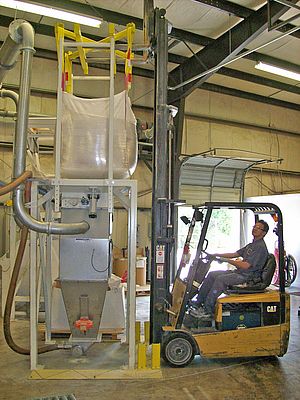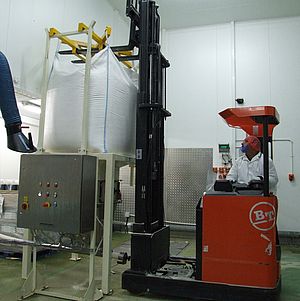Jowat Adhesives purchased a totally enclosed dust-tight Bulk Bag Discharger/Sack Tip Station for its manufacturing plant in High Point, North Carolina, USA. The plant produces a comprehensive range of adhesives for a variety of industries. An eco-friendly manufacturer, Jowat Adhesives produces environmentally-safe industrial adhesives for a variety of applications in the wood, furniture, paper, packaging, construction, upholstery, automotive, textile, general assembly, mattress and foam converting industries. The industrial adhesives manufactured at the Jowat plant include dispersion, hot melt, solvent-based, moisture curing and a variety of others too. Jowat Corp. is a wholly owned subsidiary of Jowat Adhesives AG, a 90-year old German company with sales in more than 60 countries. “We wanted to avoid any dust contamination from the many different resin flakes running through the discharger used to produce our broad line of industrial adhesives,” advises Mike Kuhn, Plant Engineer at Jowat Adhesives, Inc. “We were seeking a system that was totally enclosed and didn’t have seams or small holes, like some other dischargers, through which dust could penetrate and contaminate the working environment.” To find a discharger that met their requirements, which included the facility to handle 50 lb sacks too, Kuhn and some of his fellow engineers visited a powder show in Charlotte, North Caroline, USA back in March 2008. At the Spiroflow Systems stand, they found exactly what they needed in the ‘Spiroflow’ Type 2 Bulk Bag Discharger. Spiroflow Systems custom designed their discharger to meet Jowat Adhesives’ exact specifications. Not only does the unit accept two sizes of bulk bags, it incorporates a sack tip station too. Within two months, the unit was installed at the plant in High Point and, according to Kuhn, has been running 24/7 and operating flawlessly ever since. “The ‘Spiroflow’ Discharger is clean, operator-friendly, easy to load, compact and takes up less space than the other dischargers in our plant,” Kuhn advises. “Our productivity and environmental quality have also been enhanced.” Kuhn adds. To remove any dust that escapes from the bag during untying or removal, the discharger’s dust containment cabinet connects to Jowat’s central dust collection system, The ‘Spiroflow’ Type 2 Bulk Bag Discharger at Jowat Adhesives has a surge hopper that was custom designed in stainless steel to accept resin flakes in 1,000 lb Supersacks, 500 lb Mini-Sacks or 50 lb bags. Resins are gravity fed from the discharger, through the surge hopper and into a vacuum conveyor at the base of the discharger. The vacuum conveyor transfers the resins from the discharger to a process vessel in a totally controlled and dust-free manner. “The manual dumping station facilitates the addition of minor additives into the process and gives Jowat a fall-back position should the supply of material in the larger bulk bags be disrupted,” notes Mathias Lee, Vice-President of Sales at Spiroflow Systems Inc. The ‘Spiroflow’ Type 2 Bulk Bag Discharger at Jowat Adhesives includes spring-loaded arms to support the bag lifting frame, the integral bag dumping station, bag spout closure bars and a bag base massage system. The Spring-loaded bag support arms gradually rise and tension the bag during emptying to ensure complete discharge of the resin flakes. The arms also prevent the bag spout or liner from sagging. According to Kuhn, this is a winning feature for Jowat. “What this does is assure material flows as the bag gets lighter by raising it so it’s easy to empty,” he said. Bag spout closure bar control the flow of resins and pinch the neck of the bag above the point where the outlet spout is untied and re-tied. Once the spout is untied, the pinch bars are opened to allow discharge. The Pinch Bars are interlocked and can only open after the access door in the dust cabinet has been closed. This is both for safety and for greater dust containment. An adjustable bag base massage system assures consistent flow of the resins from any bags that have become compacted during transportation or storage. “With the Type 2 Discharger, our environmental quality and productivity have been enhanced,” confirms Kuhn. “We are completely satisfied with the system.”


















